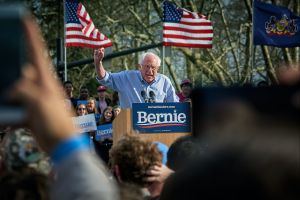Survey data shows Sanders supporters are concerned about global overreach and that it comes at the expense of the economy and general quality of life.
Already the theme for the Democratic National Convention this week, the issue of party unity will be center stage following the leak of Democratic National Committee emails and resignation of DNC Chief Debbie Wasserman Schultz. Though protests are expected outside the convention hall, a new Chicago Council Survey among the American public, conducted June 10-27, 2016, finds that most Democrats and Democratic-leaning Independents have coalesced around Hillary Clinton.
Nevertheless, there are some points of difference—mainly in degree rather than direction—between those who initially stood by Sanders and those who initially supported Clinton as the party’s nominee. Most particularly, these differences reveal that core Sanders supporters prefer a more circumscribed international engagement with concerns that global overreach comes at the expense of attention to economic and quality of life issues.
Nine in Ten Democrats Support Hillary Clinton
Regardless of their initial allegiances during the primary season, nine in ten self-described Democrats (91%) and Democratic-leaning Independents (87%) have come around to support Hillary Clinton against Donald Trump for president, even prior to Sanders’ endorsement.
But Hillary Clinton was not the top choice for many Democrats who had hoped that Bernie Sanders would win the party’s nomination. Core Sanders supporters (defined here as the 36% who said the Senator was their top choice) and core Clinton supporters (the 47% for whom the Secretary was top choice) differ on a number of policy items.
Generation Gaps
Given the generational turnout at Sanders’ rallies, it is not surprising that there is an obvious age difference between the two candidates’ supporters. These age differences seem to influence, to some extent, views on specific foreign policy issues among each candidate’s core supporters.
- Senator Sanders’ supporters are far more likely than Secretary Clinton’s to be between the ages of 18 and 29 (36% Sanders vs. 16% Clinton).
- By contrast, Clinton’s are much more likely to be over age 60 (32% Clinton vs. 17% Sanders).
Sanders Supporters Say United States Most Influential, But Not the Greatest Country
Core Sanders and Clinton supporters are equally likely to rate the United States as the most influential country in the world. But Sanders backers are much less likely to say that to say that it is “the greatest” country in the world because of its unique character.
- On a ten-point scale, core Clinton supporters rate US influence at 8.9, and Sanders backers rate the United States an 8.5.
- Core Clinton supporters are more likely than core Sanders backers to say the United States has a unique character that makes it the greatest country in the world (61%, vs. 39% Sanders supporters).
- Conversely, core Sanders supporters are more likely to say that every country is unique, and the United States is no greater than other nations (61%, vs. 37% core Clinton supporters).
Views of American Exceptionalism
Views among Democrats and Democratic-leaning Independents whether the US has a unique character that makes it the greatest country in the world, or every country is unique and the US is no greater than other nations.
Sanders Supporters’ Economic Pessimism
The results suggest that core Sanders supporters think the way to make America great again is not by safeguarding its military and economic influence, but by focusing on domestic problems like economic mobility and inequality.
- Core Sanders supporters are even more convinced than Clinton supporters that economic strength is more important in determining a country’s overall power and influence in the world (89% vs. 74%).
- Core Sanders supporters are much less likely to emphasize maintaining superior US military power (29% vs. 54% among core Clinton supporters) or superior economic power (34% vs. 56%) as very important goals.
- In a question designed to tap into the idea of the American dream, 57 percent of core Sanders and 41 percent of core Clinton supporters say that “the next generation of Americans who are children today” will be economically worse off than “the generation of adults who are working today.”
An analysis of a survey conducted for the American National Election Studies in late January 2016 reported in The New York Times backs this up, finding that Sanders supporters were more pessimistic than Clinton supporters about “opportunity in American today for the average person to get ahead” and more likely to say that economic inequality had increased.
Sanders Supporters Prefer a More Circumscribed Role for the United States
Given their downbeat view of US economic promise for the next generation, it makes sense that Sanders’ supporters emphasize attention to economic mobility and inequality. In turn, they express a preference for a somewhat more circumscribed international role for the United States. They are even more likely than Clinton supporters to emphasize a shared leadership role and seem to want to avoid overreach or antagonizing other major powers.
- As is typical for younger Americans in Chicago Council Surveys reaching back to 1974, a smaller percentage of core Sanders supporters than core Clinton supporters—though still a solid majority—say the United States should play an active part in world affairs (66% Sanders vs. 75% Clinton).
- Core Sanders supporters are also more inclined to favor the United States playing a shared leadership role in the world (83% vs. 64% among core Clinton supporters) rather than a dominant role (12% vs. 29% core Clinton supporters).
- But this does not mean they are isolationists: only five percent of core Sanders and seven percent of core Clinton supporters say the United States should not play any leadership role in the world.
- As is typical of younger Americans, Sanders supporters are less likely to sense a critical threat from international terrorism (64% vs. 75% core Clinton supporters) and they are less likely to support a series of military actions to combat terrorism (more details in a forthcoming report).
A larger majority of core Sanders supporters than Clinton supporters say that the United States should undertake friendly cooperation rather than actively work to limit China’s (77% core Sanders vs. 66% Clinton) and Russia’s power (68% Sanders vs. 58% Clinton).
The United States' Role
What role should the US play in the world (among Democrats and Democratic-leaning Independents)?
Trade Differences: Much Ado About Nothing?
One repeated flash point in the debates between the two candidates was US trade policy, in particular the Trans-Pacific Partnership. Although core Sanders supporters are less likely than Clinton supporters to credit international trade with creating US jobs, there are surprisingly small differences between the two groups on trade in general.
- Core Sanders backers are less likely than core Clinton supporters to say that international trade is good for creating US jobs (51% vs. 41%).
- But otherwise core Sanders and Clinton supporters both say that international trade is good for the US economy (71% Clinton, 67% Sanders) and their own standard of living (75% Clinton, 70% Sanders).
- Core supporters of both Sanders and Clinton say that globalization is mostly good for the United States (76% Clinton, 75% Sanders).
- Finally, fewer Sanders supporters—but still a majority—favor the Trans-Pacific Partnership trade agreement (56%, vs. 74% of Clinton supporters).
Trade Views
Among Democrats and Democrat-leaning Independents.
A Generally Unified Party
Despite these differences, there are many areas of agreement between Sanders and Clinton supporters, including the top priorities for the country and the top threats to US interests. Both Sanders and Clinton supporters favor taking action on climate change, support for a path to citizenship for illegal immigrants in the United States, and emphasize similar methods to achieve US foreign policy goals.
Methodology
The analysis in this report is based on data from the 2016 Chicago Council Survey of the American public on foreign policy. The 2016 Chicago Council Survey was conducted by GfK Custom Research using their large-scale, nationwide online research panel between June 10-27, 2016 among a national sample of 2,061 adults, 18 years of age or older, living in all 50 US states and the District of Columbia. The margin of error ranges ±2.2 to ±3.5 percentage points, depending on the specific question, with higher margins of error for partisan subgroups. For the analysis among Democrats included here, the margin of error ranges from ±7.2 to ±10.3 percentage points, again varying depending on the specific question.
Unless specified otherwise, references to Democrats in this report refer to those who self-identified as Democrats and those who self-identified as an Independent that is “closer to the Democratic party.”
Respondents were asked two separate questions about voting preferences. The first asked “If the presidential election were being held today and the candidates were Hillary Clinton, the Democrat, or Donald Trump, the Republican, for whom would you vote? The response categories were randomized. The second question, which we used to determine core Clinton and Sanders supporters asked “Regardless of your voting preference in the previous question, who was your top choice for president among the following candidates—Hillary Clinton, Donald Trump, Bernie Sanders, Ted Cruz, John Kasich, Marco Rubio, Jeb Bush, or other (specify)?” These response options were also randomized.
The 2016 Chicago Council Survey is made possible by the generous support of the John D. and Catherine T. MacArthur Foundation, the Korea Foundation, and the personal support of Lester Crown and the Crown family.






